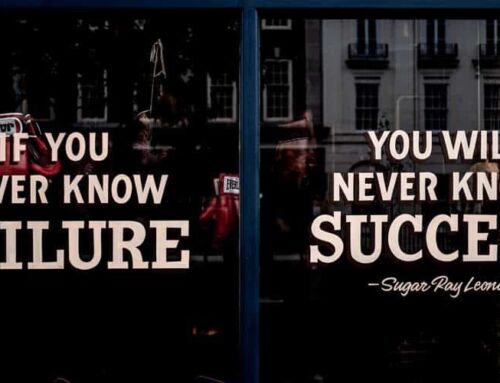In this article, I’m going to show you how to get clear on the direction you want your music career to go using SMART goals.
In fact, we at Eleven use a form of SMART goals to define the 3 primary objectives we want to achieve annually as a business.
They are used in our company mission until we reach them so that everyone on our team knows what we need to do to grow.
Ready? Let’s go!
The Use of Goals in Music Isn’t Trending… Yet.
Most music creators are creative types, putting their focus on creating the art and music first. Once they wrap up the final product, it goes straight to social media, distribution, BandCamp, Spotify, and other platforms of their choice.
They give it a few days to a month to blossom and then they are done with that track and onto the next one.
That is the exact recipe for the OPPOSITE of music success. This is the same as hopping on a hamster wheel and running on it for a month, taking a 5 minute break, and doing it again.
The definition of insanity is doing the same thing over and over and expecting different results. And last time I checked, insanity does not contribute toward setting a clear direction for anything.
We Aren’t the First One to Preach About the Importance of Goals for Musicians
Industry expert Ari Herstand has been preaching about setting goals for musicians for years. Take this quote he gave during a podcast interview back in 2015:
“Until you understand what your goals are and what your ultimate why is, then you really have no idea what you should be doing. So that’s step one is, “What are my interests? What are my goals, six-month, one-year, and five-year goals?” And then once you set those up, identify if they’re authentically you, or if they’re goals that other people are throwing at you. And if these goals actually resonate with you and you feel at peace with them, then you can reverse engineer them. Then you figure out, “Okay, how do I achieve these goals?” And then you start to put in the work.”
– Ari Herstand (Modern Musician Podcast)
And of course, you can find countless other quotes and articles sprinkled around the Internet regarding how musicians, DJs, and producers need to do a better job of setting goals in order to know what they are trying to achieve, so we won’t beat a dead horse here.
So How Do You Set Goals for Musicians? Ask Your Car’s Navigation System.
The easiest analogy I can think of for setting goals is none other than your car’s GPS or navigation system:
STARTING POINT A: Where Are You Leaving From?
Your GPS needs to know where you are starting from. For your music career, this means figuring out some benchmarks or current metrics that can help you show your progress. Some examples of “POINT A” include a monthly revenue figure, the size of your fan email list, or how many live shows you are currently booking per month.
OUR RECOMMENDATION: If you aren’t sure the best metric to use, I would highly recommend going with the monthly revenue figure. This metric is the gold standard in making sure your live shows, your music, your fans, and every other aspect of your music career are producing what you need to be successful and sustainable.
DESTINATION POINT B: Where Are You Going?
Your GPS needs to know where the journey ends so it can calculate your distance, estimate time to your arrival, and total duration of the trip. For your music career, this means visualizing what success looks like to you and really detailing a vision for where you see yourself at the end so you know you’ve reached the point you set for yourself.
Here’s an example of what visualizing your career destination might look like:
“When I reach my destination, I will be touring nationally 3-6 months of the year, performing 4-6 shows a month, writing and recording a new album once a year, and generating $3,500/month in gross revenue. I will have acquired 1,500 subscribers to my free email list, 100 paid subscribers on my Patreon, and be selling about $500/month combined from online music stores (Bandcamp, iTunes, etc.). I will also be averaging 1-2 sync licensing deals a year and selling $200/month worth of merchandise online and at shows. For the 6-8 months I am not touring, I will be writing songs, putting together a strategy for the next year, or taking a vacation with my family.”
Can you see that in your head? All those specific destinations will allow you to cherry pick from the pile and build goals around 2-3 of those visions at a time.
GOING FROM POINT A TO POINT B: Don’t Cross the Streams!
Your starting point and destination should both use the same metric so you can compare apples to apples. Starting with a revenue figure and ending with a total number of subscribers in your email list does not translate well and can cause confusion as to whether or not you succeeded.
If you wish to track both of these metrics, consider “bundling” your progress using a couple of different metrics, either as one goal or as several goal statements:
ONE GOAL: I want to reach $1,000/month and 1,000 subscribers by the end of 2024
TWO GOALS: I want to reach $1,000/month in revenue by the end of 2024. I want to reach 1,000 subscribers on my email list by July 1, 2023.
The first example with one goal means you’d like to hit both of those metrics by the same deadline. The second example with two goal statements lets you focus on growing both goals but prioritizes one of them to be completed first.
YOU ARE HERE: Where Are You Now? And Now? How About Now?
It can be addicting to watch yourself on a GPS map as you drive along the highway. It’s especially mesmerizing for your kids (if you have them). When it comes to your music career, the line or pulsing dot on the screen shows you where you currently are on your journey. While we don’t have a pulsing dot showing us our progress, but defining our starting point and ending points, we can create the gauge or meter to help us see our progress at a glance.
Of course, the biggest difference between a GPS system and your career goals is that your career goals won’t give you turn-by-turn voice directions!
How Do I Set Goals? Use the SMART Framework.
You’ve probably heard the term “SMART Goal” before, and maybe even wondered why the word “SMART” is capitalized. This is because it’s an acronym that explains how to build goals that are easy to digest, easy to measure, realistic to attain, and hold you accountable to a specific timeframe:
- Your goals should be SPECIFIC (S)
- Your goals should be MEASURABLE (M)
- Your goals should be ATTAINABLE (A)
- Your goals should be REALISTIC (R)
- Your goals should be TIME BOUND (T)
So what does this acronym mean for our goals? By using these rules, we can:
- Control how clear our GPS route is
- Easily know where we are along the way
- Easily reach our destination and not get lost in a remote location
- Keep our destination grounded instead of stretching ourselves too thin too soon
- Set a deadline so we stay focused and keep moving the dot along our route
Here’s an example of a SMART goal using this framework:
“I will grow my fan email list by 100 new subscribers by March 31”
- It’s SPECIFIC: It is detailed and establishes a specific task
- It’s MEASURABLE: You will be able to see your list grow in your email software
- It’s ATTAINABLE: It’s progress but it’s not so big that it’s out of reach
- It’s REALISTIC: You aren’t going to go crazy trying to reach it. You got this!
- It’s TIME BOUND: You set a deadline of March 31 so you know when to review
If we go back up in the article to our other examples of goals, you’ll notice the bundled goals are also examples of SMART goals.
Here are a few more examples of SMART goals based on the visualization above:
“I will tour and play 4 shows a month for 3 months by October 31”
“I will reach 100 paid subscribers on Patreon by the end of 2022”
“I will sign one sync licensing deal by the end of this quarter”
“I will take a family vacation after I return home from my tour on November 1”
What Happens When I Reach My Destination?
Reaching your destination means you’ve successfully reached your first round of goals. Congratulations! But that doesn’t mean your career’s progress ends and nothing changes after that.
Goals let you achieve success in phases or milestones. Setting your first goal lets you define the first leg of your journey up the mountain. When you reach your goal’s destination, you’ve made it to the first base camp up the side of the foothills. From this base camp, you now reset your starting point and destination to help you plan for the next phase of your trip.
This process will continue indefinitely, or until you have had enough growth and feel your career is as super-duper as it’s ever going to be. :)
Now It’s Time to Define Your SMART Goals
Now it’s your turn!
Think about how long you want to plan out in advance. If it’s later in the year, think about trying to accomplish a few goals by December 31. If it’s earlier in the year, consider planning what the rest of the year looks like.
If you’d prefer to do something bigger, such as a 10-year or 5-year plan, go for it! You can always set long-term plans and then use SMART goals to define the milestones or baby steps for whatever intervals you’d like (a year at a time, a quarter at a time, etc.).
Here’s an easy 6-step project you can follow to plot out your music career:
- Sit down, either as a band or with a friend or spouse. It’s best to do this with at least one other person, otherwise your goals could be self-biased. Make sure they clearly reflect where you see yourself and your music going between now and the timeframe you set for yourself.
- Think about your big picture vision. Why did you become a musician? Why are you pursuing music in the first place? Is it truly where your heart and intuition rest? Or is this just a hobby with the goal of making side income? What do you want this journey to accomplish? What is the final scene when your movie or story ends? Write it down. This is your POINT B.
- Think about where you are now. What is your current music revenue? How many fans do you have? How many shows do you currently perform? Are there other metrics that are more important to you? Write out your current state. This is your POINT A.
- Now think about your journey. What would you like to change? What are some ideas that would help bridge the gap between where you are now and where your POINT B is? Assemble a short list.
- Write your SMART goals. Take that short list of ideas that would help bridge the gap between A and B and apply the SMART goal framework to them. For example, if you wrote down “play more shows” or “release a new album“, then you could say “I will consistently play 4 shows a month by June 15th” or “I will release a new album to my fans by August 1st”. With these specific outcomes in mind you can start to break down what actions you’ll need to take to reach them.
- AND THE MOST IMPORTANT THING: You actually have to follow through and do those goals once they are created. Just because you wrote them down doesn’t mean they magically do themselves! If you think this will be a problem, consider getting a career coach to help you stay focused and accountable. Happy Goal Planning!
NEED AN EXAMPLE? Eleven’s own DJ Stacktrace put this goal planning framework to the test and shared his own experience with it in a case study. Check it out!

Stop Feeling Isolated & Let’s Build Your Music Career Together
Are you a serious career musician looking for help from real industry humans?
Are you fed up with the lack of help from the many online music cliques?
Join Career Musicians Made Simple today and gain access to:
- Music Career Success Specialists who truly care about your success
- A community of musicians helping each other overcome similar struggles
- Guides and frameworks that give you tangible results when applied properly
- Special live events that let you ask questions and get focused attention



